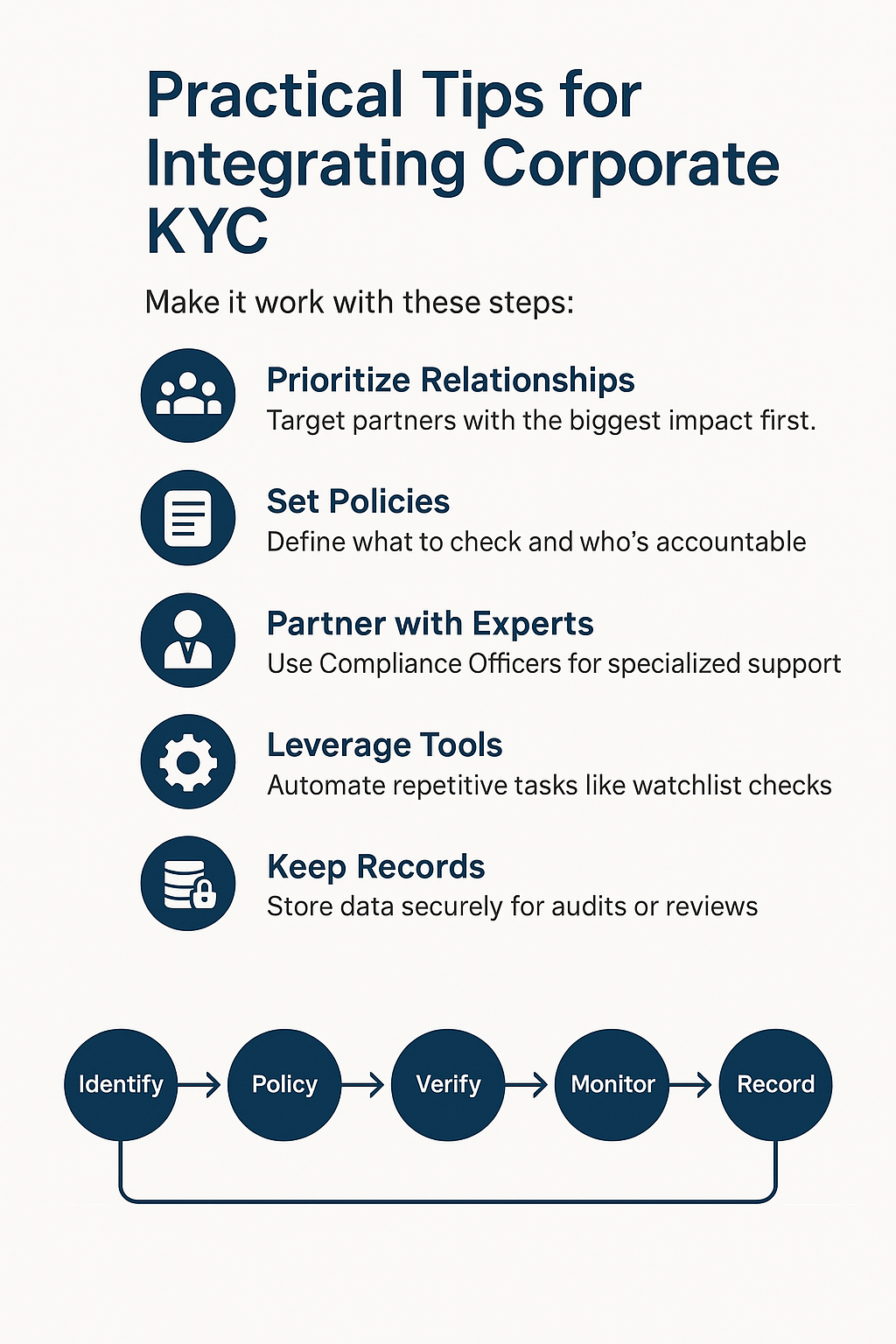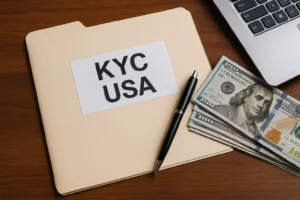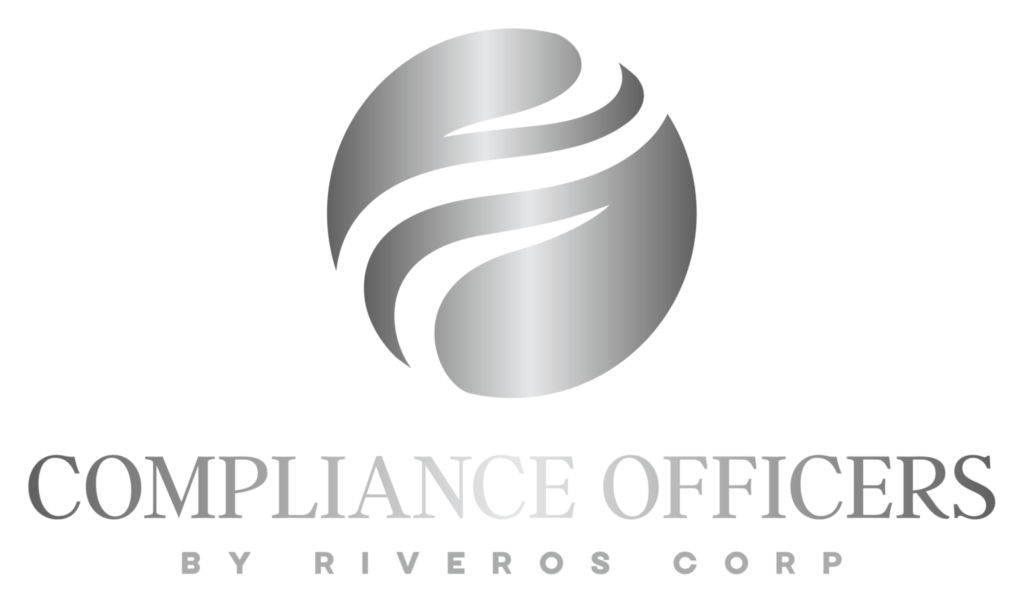An in-depth guide to understanding Corporate KYC, its role in preventing financial risks, and why Compliance Officers is the ideal partner for background checks, structure verification, and risk-list screening.
Introduction
What happens when a trusted supplier turns out to be a front for financial fraud? In today’s interconnected business landscape, where companies depend on strategic suppliers and clients for success, corporate KYC (Know Your Customer) has become a non-negotiable shield against such risks. This process goes beyond simple trust, digging into the backgrounds, structures, and reputations of high-priority partners to safeguard your operations. Businesses can’t afford to roll the dice with disreputable entities—compliance gaps could spark legal battles, financial losses, or a tarnished public image.
This article unpacks the power of Corporate KYC, showing how it roots out financial crime and why Compliance Officers stands out as your go-to ally for thorough due diligence. From unmasking hidden owners to screening global risk lists, Compliance Officers delivers the insights you need to protect your company at every step.
What Is Corporate KYC?
Corporate KYC adapts the classic Know Your Customer framework—typically used for individuals—to the business realm. Often dubbed Know Your Business (KYB), it’s a cornerstone of corporate due diligence, focusing on verifying a company’s legitimacy, ownership, and risk profile. Unlike checking a driver’s license, Corporate KYC dives into:
Legal Verification: Confirming a business exists through registration papers, incorporation certificates, and articles of association.
- Ownership Structure: Pinpointing ultimate beneficial owners (UBOs) who control the entity.
- Risk-List Screening: Scanning databases for signs of fraud, sanctions, or unethical behavior.
This rigorous process ensures you’re not partnering with criminals or fronts for money laundering, terrorism financing, or other illicit schemes.
How Corporate KYC Prevents Financial Crimes
Corporate KYC is your frontline defense against financial threats. By demanding transparency from partners, it plugs gaps where crime could thrive. Here’s how it works:
Identifying Shell Companies
Fraudsters love shell companies—empty husks masking shady dealings. Corporate KYC peels back these layers, spotting red flags like vague ownership or inactive operations before you sign a deal.
Risk Assessment
Does your client show up on a sanctions list? Are they linked to politically exposed persons (PEPs)? Corporate KYC uncovers these risks, giving you the data to decide if a partnership is worth pursuing.
Regulatory Compliance
Governments worldwide enforce KYC to fight money laundering and terrorism financing. A solid Corporate KYC process keeps you on the right side of Anti-Money Laundering (AML) laws, dodging fines and protecting your brand.
Enhancing Stakeholder Confidence
Investors, regulators, and customers notice when you prioritize compliance. A strong Corporate KYC approach signals integrity, strengthening trust and opening doors to better relationships.
Differences Between Individual KYC and Corporate KYC
Both aim to verify legitimacy, but Corporate KYC is a different beast:
- Complexity: Individual KYC checks IDs; Corporate KYC dissects ownership layers, addresses, and legal documents.
- Scope: Individual KYC suits banks; Corporate KYC spans industries, vetting suppliers, clients, and partners for financial or legal breaches.
- Regulations: Individual KYC focuses on personal identity; Corporate KYC tackles AML and international watchlists, too.
- Monitoring: Individual updates are occasional; Corporate KYC demands frequent reviews as businesses evolve.
These distinctions make Corporate KYC a heavier lift—but a vital one for strategic ties.
Key Elements of a Robust Corporate KYC Process
A top-tier Corporate KYC strategy goes deep, delivering a full risk picture:
- Background Verification: Checking registration and legal records confirms a partner’s identity.
- Ownership Structure Analysis: Mapping out UBOs reveals who’s really in charge—crucial for spotting hidden risks.
- Risk-List Screening: Cross-referencing sanction lists, PEP databases, and adverse media flags potential troublemakers.
- Ongoing Monitoring: Regular updates catch shifts like mergers or new red flags, keeping your diligence current.
For example, a supplier might look solid on paper but hide a sanctioned owner. Corporate KYC catches that before it’s too late.
Challenges in Implementing Corporate KYC
It’s not all smooth sailing:
- Data Fragmentation: Ownership details might be scattered across jurisdictions or missing entirely, muddying the waters.
- Lack of Standardization: Varying global rules create compliance headaches without a unified approach.
- Resource Intensity: Manual checks on complex entities drain time and budgets, tempting shortcuts.
- Evolving Requirements: Fast-changing laws demand constant vigilance to stay compliant.
These hurdles underscore the need for expertise—like what Compliance Officers provides.
(Image suggestion: Infographic here showing «Challenges» with icons: a puzzle for fragmentation, a globe for standardization, a clock for resources, and a legal scale for regulations.)
Why Automation and Technology Matter
Technology is revolutionizing Corporate KYC. Automated tools, AI, and analytics speed up background checks, flag suspicious patterns, and track ownership shifts. They don’t replace human judgment but amplify it—cutting errors and delivering quick insights on risks like sanctions or negative press. For instance, software can instantly scan thousands of watchlists, a task that would take days manually. Pairing this with expert oversight ensures precision and efficiency, making Corporate KYC manageable for any business.
Compliance Officers: The Premier Ally for Strategic Supplier and Client Verification
Compliance Officers shines by zeroing in on what matters: verifying strategic partners through Corporate KYC. Here’s how they excel:
- Background Verification: They scrutinize legal records and financial histories, catching fraud early.
- Ownership Analysis: Digging into complex structures, they expose hidden UBOs tied to misconduct.
- Risk-List Screening: Using up-to-date databases, they ensure partners are free of sanctions or illicit ties.
- Ongoing Monitoring: They track changes, alerting you to new risks in real time.
- Focus on Strategy: They prioritize high-stakes partners, protecting your core operations.
Imagine a key supplier with a clean facade but a sanctioned owner—Compliance Officers uncovers that risk before it hits your bottom line.
Practical Tips for Integrating Corporate KYC

Conclusion
Corporate KYC isn’t just a buzzword—it’s a must-have for businesses relying on strategic suppliers and clients. By verifying backgrounds, mapping ownership, and screening risks, it shields you from legal woes and financial hits while boosting trust. Compliance Officers takes this to the next level, offering targeted expertise that simplifies Corporate KYC for your most critical partnerships. In a world where one bad partner can sink your reputation, their focus on due diligence is your edge. Embrace Corporate KYC with Compliance Officers and turn compliance into a strength.
Legal Disclaimer:
This article is provided for informational purposes only and does not constitute legal advice. The content herein is not intended to substitute professional legal consultation. For specific guidance regarding your individual circumstances, please consult directly with a qualified attorney licensed to practice in your jurisdiction.









